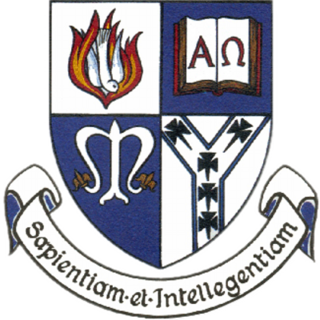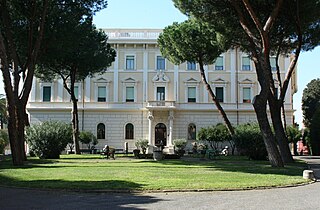Related Research Articles

Mater Dei Institute of Education was a linked college of Dublin City University from 1999 until its closure in 2016, located in Drumcondra, Dublin City, Ireland, near Croke Park, on the site of what was formerly Clonliffe College, the Roman Catholic Seminary for the Archdiocese of Dublin. The college was founded by Archbishop John Charles McQuaid in 1966 as an institute for the training and formation for teachers of religion in secondary schools in the Republic of Ireland. Clonliffe was also affiliated to the Angelicum in Rome that offered a three-year course leading to a diploma and a four-year course leading to a Masters; Fr. Joseph Carroll was its first president. Other Presidents of the College included Msgr. Michael Nolan, Dr. Dermot Lane and Sr. Eileen Randles IBVN(1986-1995). The foundation of the college was a response to the challenges posed by the Second Vatican Council. It had a Roman Catholic ethos and had approximately 800 students.

Clongowes Wood College SJ is a voluntary boarding school for boys near Clane, County Kildare, Ireland, founded by the Jesuits in 1814, which features prominently in James Joyce's semi-autobiographical novel A Portrait of the Artist as a Young Man. One of five Jesuit schools in Ireland, it had 450 students in 2019.

John Charles McQuaid, C.S.Sp., was the Catholic Primate of Ireland and Archbishop of Dublin between December 1940 and January 1972. He was known for the unusual amount of influence he had over successive governments.

Michael Geoffrey St Aubyn Jackson is a Church of Ireland Anglican bishop. Since 2011, he has served as the Archbishop of Dublin and Bishop of Glendalough in the Church of Ireland. He is also the co-chairman of the Porvoo Communion of Anglican and Lutheran churches.
George Otto Simms was an archbishop in the Church of Ireland.
The Milltown Institute of Theology and Philosophy was a Jesuit-run institution of higher education and research, located in Dublin, Ireland. It was located in Ranelagh, County Dublin.

The Pontifical Irish College is a Roman Catholic seminary for the training and education of priests, in Rome. The College is located at #1, Via dei Santi Quattro, and serves as a residence for clerical students from all over the world. Designated a Pontifical college in 1948, it is the last Irish college in continental Europe.
Father Michael Hurley S.J. was an Irish Jesuit priest and theologian, who has been widely called the "father of Irish ecumenism" for promoting Christian unity. Hurley co-founded the Irish School of Ecumenics in 1970 and served as the school's director until 1980.

University College Dublin is a public research university in Dublin, Ireland, and a member institution of the National University of Ireland. With 33,284 students, it is Ireland's largest university, and amongst the most prestigious universities in the country. Five Nobel Laureates are among UCD's alumni and current and former staff. Additionally, four Irish Taoiseach and three Irish Presidents have graduated from UCD, along with one President of India.
John Sullivan was an Irish Roman Catholic priest and a professed member of the Jesuits. Sullivan was known for his life of deep spiritual reflection and personal sacrifice; he is recognised for his dedicated work with the poor and afflicted and spent much of his time walking and riding his bike to visit those who were troubled or ill in the villages around Clongowes Wood College school where he taught from 1907 until his death.

Fr Peter McVerry, SJ is a Roman Catholic priest, notable for battling homelessness in Ireland. According to one report, the trust which he founded helped 3,600 homeless people in Dublin in 2013.
The Spirituality Institute for Research and Education (SpIRE) was established in 2016 to raise awareness of spirituality as an applied academic discipline. Starting in August 2016, SpIRE in conjunction with the Waterford Institute of Technology delivers an MA in Applied Spirituality which was run from All Hallows College, Dublin and awarded by Dublin City University, and which had earlier been run from Jesuit Milltown Institute of Theology and Philosophy awarded by the National University of Ireland, from 2001 until it suspended its academic programmes in 2012. The Jesuit Library in Milltown, has acquired a number of books donated by All Hallows College from the John Hand Library on spirituality.

Alexander Aloysius "Alan" McGuckian SJ is an Irish Roman Catholic bishop and Jesuit. Since 2017, he has been the Bishop of Raphoe. He is Ireland's first Jesuit bishop.
Kimmage Mission Institute (KMI) was an educational institute of theology and cultures, founded 1991, by the Holy Ghost Fathers, at their Missionary College, in Kimmage Manor, Dublin. The Holy Ghost Fathers had a long history of teaching Theology and Philosophy in Kimmage to its missionaries. The KMI was developed as a response in the fall in vocations. As well as the Spiritans, ten other missionary congregations were involved in the institute . The KMI worked closely with its other Spiritan College on the Holy Ghost Missionary College campus, the Kimmage Development Studies Centre (DSC).
Reconciliation theology in Northern Ireland is a contextual process and a divine goal which involves working to create freedom and peace in Northern Ireland. As with reconciliation theology more widely, reconciliation theology in Northern Ireland emphasises the concepts of truth, justice, forgiveness, and repentance. A theology of reconciliation is practically applied by reconciliation communities.
Linda F. Hogan is an Irish ethicist, ecumenist and academic, specialising in Christian ethics, political ethics, human rights, gender, and ecumenism. She is Professor of Ecumenics at Trinity College Dublin, where she was also its vice-provost from 2011 to 2016. She worked as a lecturer at the University of Chester and University of Leeds before joining the staff of Trinity College, Dublin.
Philip McShane was an Irish philosopher and mathematician. He was born in Baileboro, Co. Cavan. When the McShane family moved to Dublin, Philip went to O'Connell School. He continued his education while training as a Jesuit at University College Dublin, St Stanislaus College, Tullabeg, Heythrop College (STL) and Campion Hall, Oxford (D.Phil). He was ordained a Jesuit in 1963, and spent 25 years in the order before leaving the priesthood in the 1980s. He lectured in Mathematics in UCD, in Philosophy in the Milltown Institute, and Mount Saint Vincent University, Halifax, Nova Scotia. Dr. McShane served as visiting fellow in religious studies at Lonergan College, Concordia University, Montreal.
Robert Carbery SJ (1829–1903) was an Irish Jesuit priest, who served as Rector of Clongowes Wood College, and President of University College Dublin. Born in Youghal, County Cork in 1829. He studied for a time at Trinity College, Dublin, then at Clongowes Wood College, before going to St. Patrick's College, Maynooth to study for the priesthood for the Diocese of Cloyne, where he was ordained. He then joined the Jesuits in 1854, St Acuil, Amiens in France. He taught for some twelve years at the Jesuit St Stanislaus College, Tullabeg, Co. Offaly, he taught at Clongowes, and served as Master of Novices in Milltown Park. While in Miltown he befriended the writer William Carleton although a convert to Anglicanism, Fr Carbery offered him the last rites, which Carleton politely refused. Fr Carbery was appointed Rector of Clongowes in 1870 serving until 1876. He succeeded William Delany SJ as President of University College Dublin, in 1888 and was also succeeded by Fr Delany in 1897.
Cecil McGarry S.J. (1929-2009) was an Irish Jesuit priest and educator, who served as Provincial of the order in Ireland and rector of the Jesuit Milltown Park. Born in Galway on January 1, 1929. He joined the Jesuits, in 1946 first at Emo Court, then Milltown Park.
The Holy Ghost Missionary College, in Kimmage in Dublin, colloquially known as Kimmage Manor, is Holy Ghost Fathers(Spiritans) institution that has served as a Seminary training missionary priests and spawned two other colleges the Kimmage Mission Institute and the Kimmage Development Studies Centre.The college church, The Church of the Holy Spirit serves as the parish church.
References
- ↑ "Irish School of Ecumenics". Irish School of Ecumenics, Trinity College Dublin. Retrieved 19 June 2018.
- ↑ The Irish Jesuits under Cecil McGarry SJ Jesuits in Ireland (jesuits.ie)
- 1 2 3 4 5 6 7 "Jesuit regarded by many as the father of Irish ecumenism". Irish Times . 16 April 2011. Retrieved 14 May 2011.
- 1 2 "Father Michael Hurley dies aged 87". RTÉ News and Current Affairs . 16 April 2011. Retrieved 14 May 2011.
- ↑ Canterbury Cousins: The Eucharist in Contemporary Anglican Theology, by Owen F. Cummings, Paulist Press, 2007.
- ↑ Rafferty, Oliver P. (23 April 2008). "The Irish School of Ecumenics (1970-2007): 'Floreat ut Pereat". Thinking Faith: The online journal of the Jesuits in Britain. Retrieved 19 June 2018.
- ↑ Remembering Paddy Doyle SJ By Robin Boyd, Paddy Doyle and the ISE, Jesuits in Ireland.
- ↑ Evening courses offered on theme of reconciliation Irish Times, September 17, 1996.
- ↑ North Belfast christian centre being sold off By Alf McCreary and Gary Meneely, Belfast Telegraph, July 4, 2008.
- ↑ Higher Education Review (Foreign Providers) of Irish School of Ecumenics (Trinity College Dublin) at Belfast, (UK) Quality Assurance Agency for Higher Education (QAA), May 2021.
- ↑ "The Irish School of Ecumenics (1970-2007): 'Like wheat that springs up green'". Catholicireland.net. 30 November 1999. Retrieved 1 August 2021.
- ↑ "John D'Arcy May". Irish School of Ecumenics. Trinity College Dublin. Retrieved 1 August 2021.
- ↑ "Geraldine Smyth". Irish School of Ecumenics. Trinity College Dublin. Retrieved 1 August 2021.

